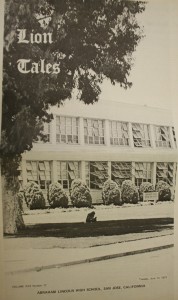1970s
1970:
CSU’s MEXICAN CULTURE DAY
April 23, 1971
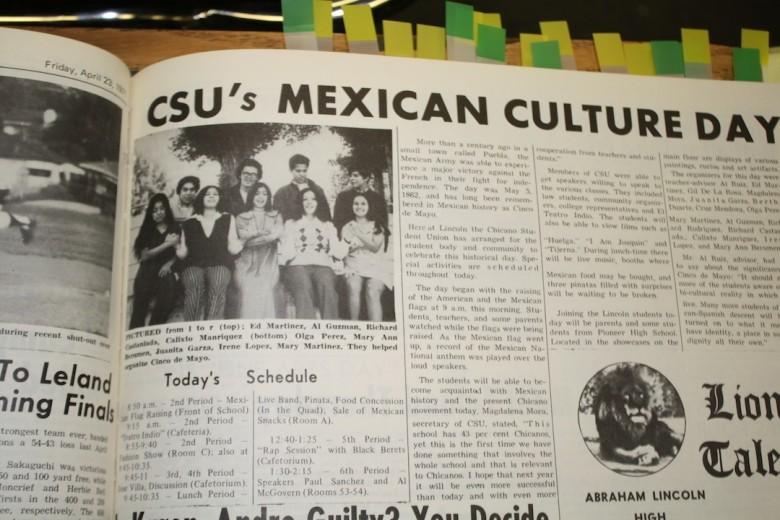
PICTURED from l to r (top); Ed Martinez, Al Guzman, Richard Castaniada, Calixto Manriquez (bottom) Olga Perez, Mary Ann Berumen, Jaunita Garza, Irene Lopez, Mary Martinez. They helped organize Cinco De Mayo.
Today’s Schedule
8:50 a.m. – 2nd Period – Mexican Flag Raising (Front of School).
9:15 a.m. – 2nd Period – “Teatro Indio” (Cafeteria).
8:55 a.m. – 2nd Period – Fashion Show (Room C); also at 9:45-10:35.
9:45-11 – 3rd, 4th Period – Jose Villa, Discussion (Cafetorium).
9:45-10:35 – Lunch Period – Live Band, Food Concession (In the Quad); Sale of
Mexican Snacks (Room A).
12:40-1:25 – 5th Period – “Rap Session” with Black Berets (Cafetorium)
1:30-2:15 – 6th Period – Speakers Paul Sanchez and Al McGovern (Rooms 53-54)
More than a century ago in a small town called a Puebla, the Mexican Army was able to experience a major victory against the French in their fight for independence. The day was May 5 1862, and has long been remembered in Mexican history as Cinco de Mayo.
Here at Lincoln the Chicano Student Union has arranged for the student body and community to celebrate this historical day. Special activities are scheduled throughout today.
The day began with the raising of the American and Mexican flags at 9 a.m. this morning. Students, teachers, and some parents watched while the flags were being raised. As the Mexican flag went up, a record of the Mexican National anthem was played over the loud speakers.
The students will be able to become acquainted with Mexican history and the present Chicano movement today, Magdalena Mora, secretary of CSU, stated, “This school has 43 per cent Chicanos, yet this is the first time we have done something that involves the whole school and that is relevant to Chicanos. I hope that next year it will be even more successful than today and with even more cooperation from teachers and students.”
Members of CSU were able to get speakers willing to speak to various classes. They included law students, community organizers, college representatives and El Teatro Indio. The students will also be able to view films such as “Huelga,” “ I Am Joaquin” and “Tijerna.” During lunch-time there will be live music, booths where Mexican food may be bought, and three pinatas filled with surprises will be waiting to be broken.
###
Vietnam – Land of ‘Happy Hunters’
May 28, 1971
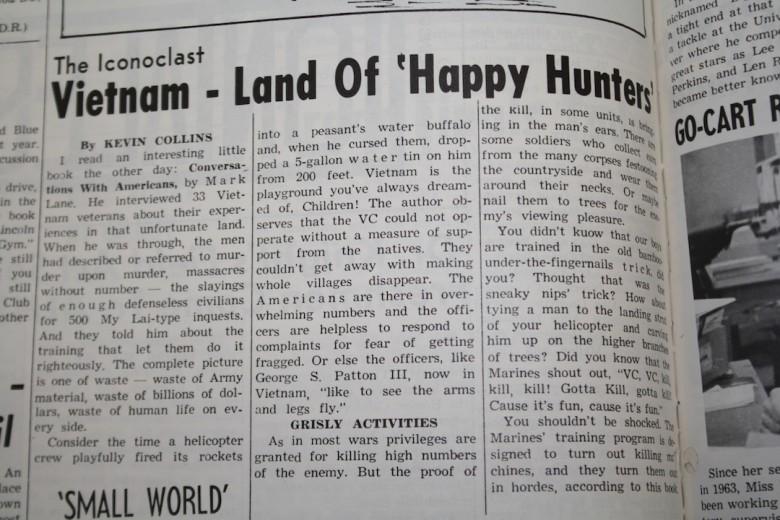
By KEVIN COLLINS
I read an interesting little book the other day: Conversations With Americans, by Mark Lane. He interviewed 33 Vietnam veterans about their experiences in the unfortunate land. When he was through, the men had described or referred to murder upon murder, massacres without number – the slayings of enough defenseless civilians for 500 My Lai-type inquests. And they told him about the training that let them do it righteously. The complete picture is one of waste – waste of Army material, waste of billions of dollars, waste of human life on every side.
Consider the time a helicopter crew playfully fired its Rockets into a peasant’s water buffalo and, when he cursed them, dropped a 5-gallon water tin on him from 200 feet. Vietnam is the playground you’ve always dreamed of, Children! The author observes that the VC could not operate without a measure of support from the natives. They couldn’t get away with making whole villages disappear. The Americans are there in overwhelming numbers and the offivers are helpless to respond to complaints for fear of getting fragged. Or else the officers, like George S Patton III, now in Vietnam, “ like to see the arms and legs fly.”
GRISLY ACTIVITIES
As in most wars privileges are granted for killing high numbers of the enemy. But the proof of the kill, in some units, is bringing in the man’s ears. There are some soldiers who collect from the many corpses festooning the countryside and wear them around their necks. Or maybe nail them to trees for the enemy’s viewing pleasure. You didn’t kuow (sp) that our boys are trained in the old bamboo under-the-fingernails trick, did you? Thought that was the sneaky nips’ trick? How about tying a man to the landing strut of your helicopter and carving him up on the higher branches of trees? Did you know that the Marines shout out, “VC, VC, kill, kill, kill! Gotta Kill, gotta kill! Cause it’s fun, cause it’s fun.”
You shouldn’t be shocked. The Marines’ training program is designed to turn out killing machines, and they turn them out in hordes, according to this book.
###
55% Latino Students at Lincoln; LSU Club Membership Is Very Low
October 8, 1971
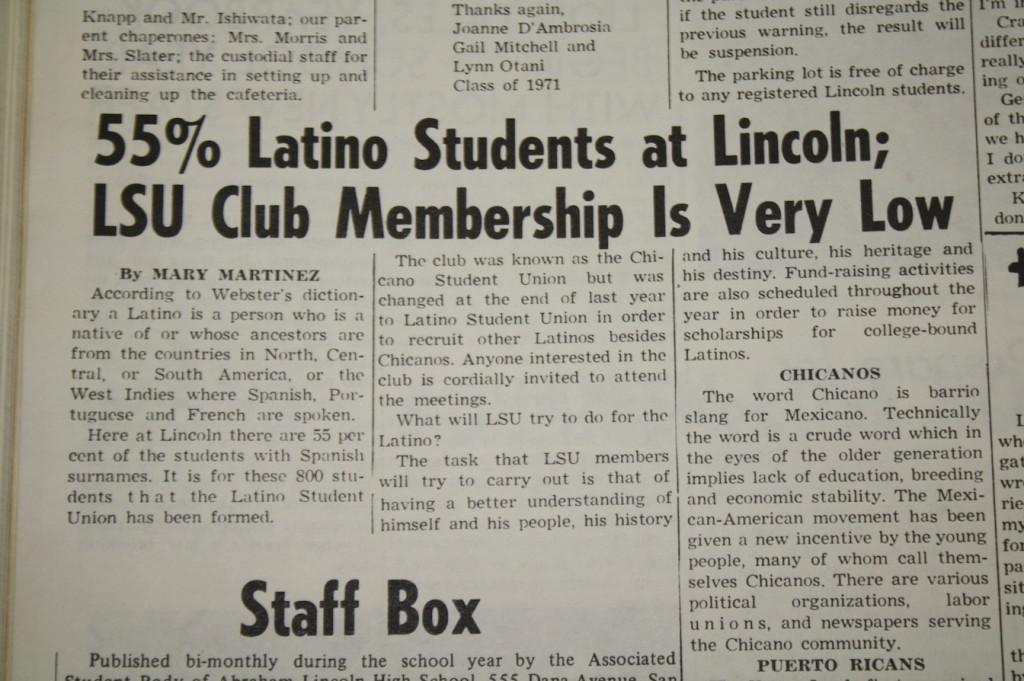
By Mary Martinez
According to Webster’s dictionary a Latino is a person who is a native of or whose ancestors are from the countries in north, Central, or South American, or the West Indies where Spanish,Portuguese and French are spoken.Here at Lincoln there are 55 percent of the students with Spanish surnames. It is for these 800 students that the Latino Student Union has been formed. The club was known as the Chicano Student Union but was changed at the end of last year to Latino Student Union in order to recruit other Latinos besides Chicanos. Anyone interested in the club is cordially invited to attend the meetings. What will LUS try to do for the Latino? The task that LUS members will try to carry out is that of himself and his people, his history, his destiny. Fund-raising activities are also scheduled to raise money for scholarships for college-bound Latinos.
CHICANOS
The word Chicano is barrio slang for Mexicano. Technically the word is a crude word which in the eyes of the older generation implies lack of education, breeding, and the stability. The Mexican-American movement has been given a new incentive by the young people many of whom call themselves Chicanos. There are various political organization labor unions and newspaper serving the Chicano community.
###
South American students need homes in San Jose
November 24, 1971
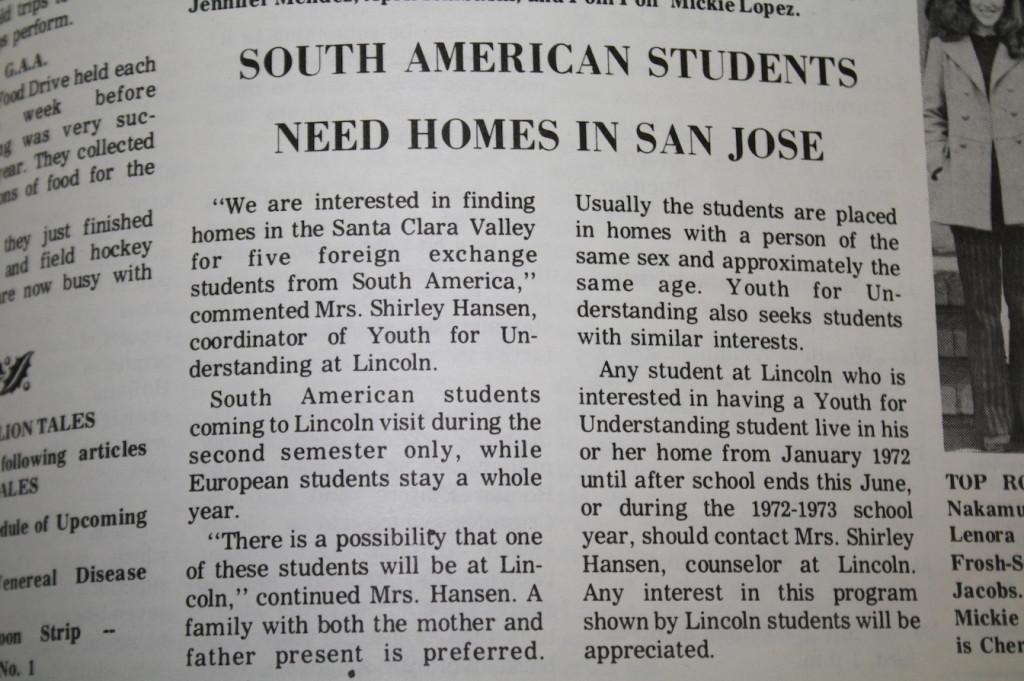
“We are interested in finding homes in Santa Clara Valley for five foreign exchange students from South America,” commented Mrs. Shirley Hansen, coordinator of Youth for Understanding at Lincoln.
South American studies coming to Lincoln visit during the second semester only, while European students stay a whole year.
“There is a possibility that one of these students will be at Lincoln,” continued Mrs. Handsen. A family with both the mother and father present is preferred.
Usually are placed in homes with the person at the same sex and approximately the same age. Youth for Understanding also seeks students with similar interests.
Any students in Lincoln who is interesting in having a Youth for Understanding student live in his or her home from January 1972 until after school ends this June, or during the 1972-1973 school year, should contact Mrs. Shirley Hansen, counselor at Lincoln. Any interest in this program shown by Lincoln students will be appreciated.
###
“1972 Swing A Thon”
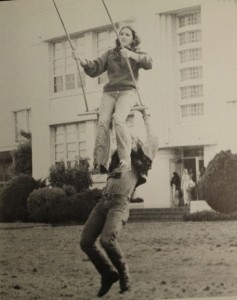
“Lincoln helped swing the bond election.It passed by a mere 1%.”
###
Legal Age 18; What It Means
April 24, 1972
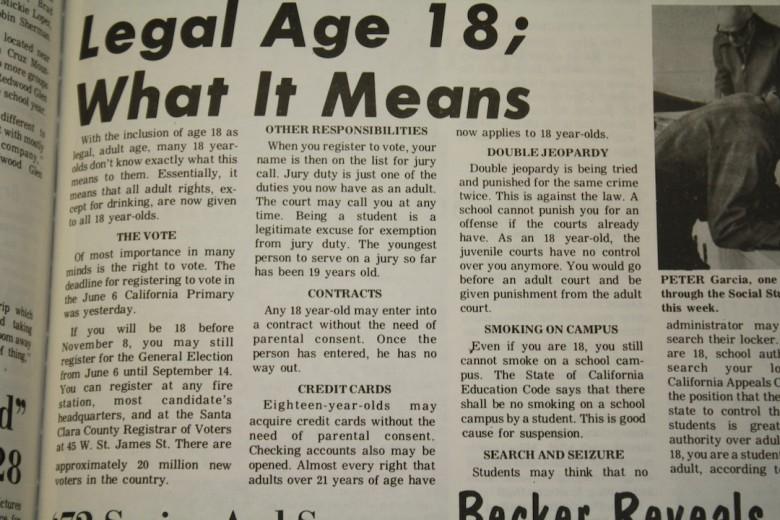
With the inclusion of age 18 as legal, adult age, many 18 year-olds don’t know exactly what this means for them. Essentially, it means that all adult rights, except for drinking, are now given to all 18 year-olds.
THE VOTE
Of most importance in many minds is the right to vote. The deadline for registering to vote in the June 6 California Primary was yesterday.
If you will be 18 before November 8, you may still register for the General Election from June 6 until September 14. You can register at any fire statio, most candidate’s headquarters, and at the Santa Clara County Registrar of Voters at 45 W. St. James St. There are approximately 20 million new voters in the country.
OTHER RESPONSIBILITIES
When you register to vote, your name is then on the list for jury call. Jury duty is just one of the duties you now have as an adult. The court may call you at any time. Being a student is a legitimate excuse for exemption from jury duty. The youngest person to serve on a jury so far has been 19 years old.
CONTRACTS
Any 18 year-old may enter into a contract without the need for parental consent. Once the person has entered, he has no way out.
CREDIT CARDS
Eighteen-year-olds may acquire credit cards without the need of parental consent. Checking accounts may also be opened. Almost every right than adults over 21 years of age have now applies to 18 year-olds.
DOUBLE JEOPARDY
Double Jeopardy is being tried and punished for the same crime twice. This is against the law. A school cannot punish you for an offense if the courts already have. As an 18 year-old, the juvenile courts have no control over you anymore. You would go before an adult court and be given punishment from the adult court.
SMOKING ON CAMPUS
Even if you are 18, you still cannot smoke on a school campus. The State of California Education Code says that there shall be no smoking on a school campus by a student. This is a good cause for suspension.
SEARCH AND SEIZURE
Students may think that no administrator may enter and search their locker. Even if you are 18, school authorities may search your locker. The California Appeals Court has held the position that the power of the state to control the conduct of students is greater than its authority over adults. If you are 18, you are a student first, then an adult, according to the Courts.
The 20 million new voters in the 1972 presidential election will hold the key to success of any candidate. The Democrats have been pulling in most of the new voters at a 3-1 rate. With the Viet Nam war, ecology, and other issues of 1972, there is little doubt that the new voters will have something to say.
###
Smoking On Campus…Soon To Be Legal?
April 28, 1972
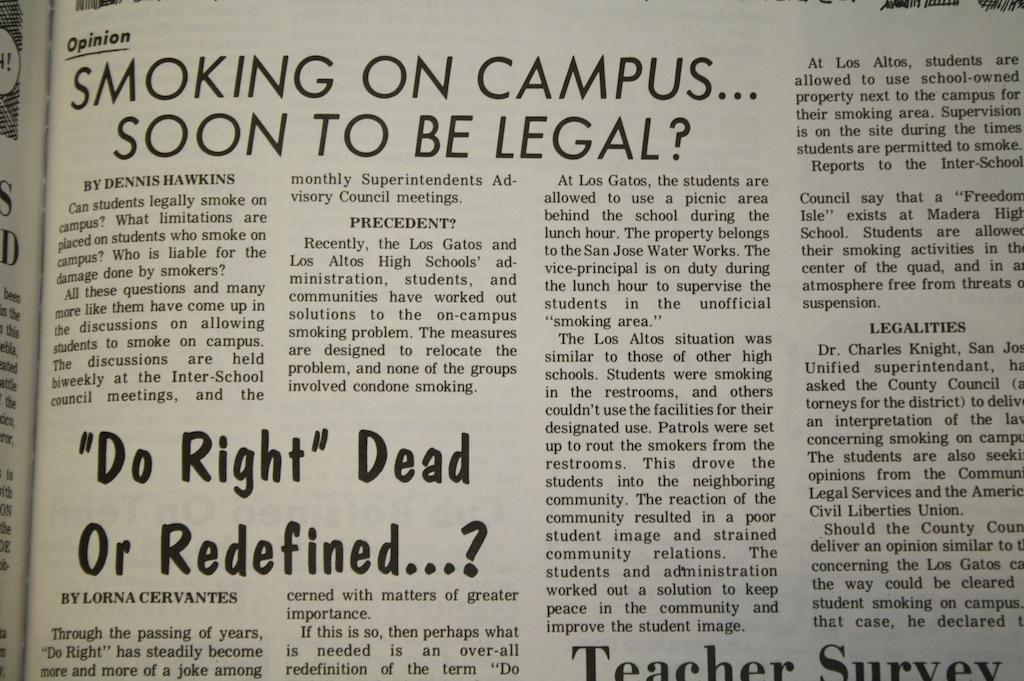
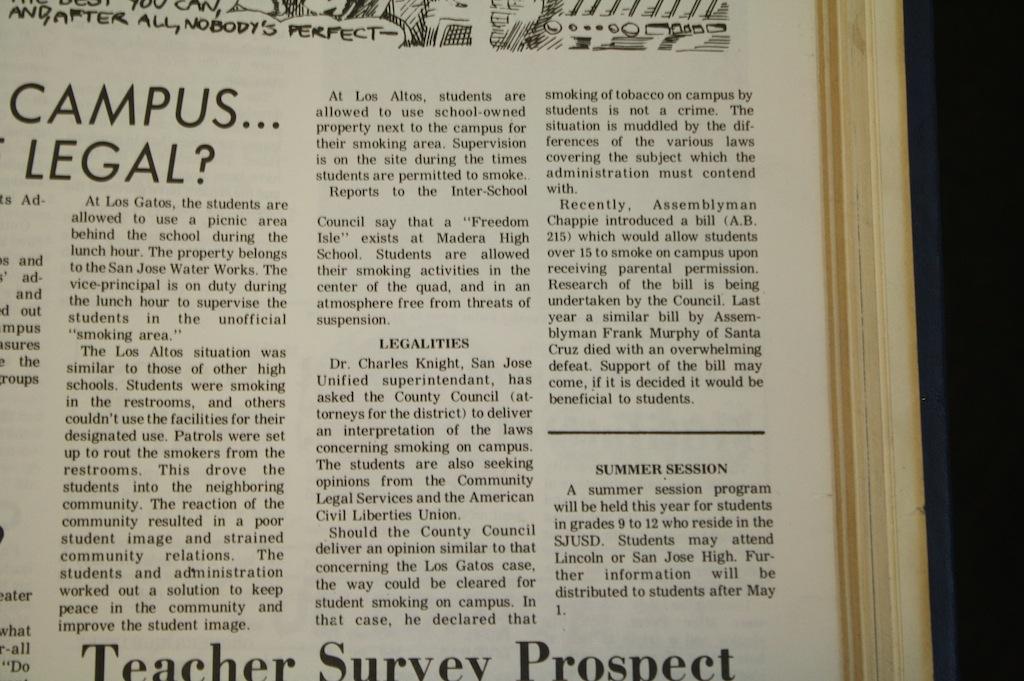
By Dennis Hawkins
Can students legally smoke on campus? What limitations are placed on students who smoke on campus? Who is liable for the damage done by smokers?
All these questions and many more like them have come up in the discussions on allowing students to smoke on campus. The discussions are held biweekly at the Inter-School council meetings, and the monthly Superintendents Advisory Council meetings.
Precedent?
Recently, the Los Gatos and Los Altos High Schools’ administration, students, and communities have worked out solutions to the on-campus smoking problem. The measures are designed to relocate the problem, and none of the groups involved condone smoking.
At Los Gatos, the students are allowed to use the picnic area behind the school during the lunch hour. The property belongs to the San Jose Water Works. The vice-principal is on duty during the lunch hour to supervise the students in the unofficial “smoking area.”
The Los Altos situation was similar to those of other high schools. Students were smoking in the restrooms, and others couldn’t use it for their designated use. Patrols were set up to rout the smokers from the restrooms. This drove the students into the neighboring community. The reaction of the community resulted in a poor student image and strained the community relations. The students and administration worked out a solution to keep peace in the community and improve the student image. At Los Altos, students are allowed to use school-owned property next to the campus for their smoking area. Supervision in on the site during times the students are permitted to smoke.
Reports to the Inter-School Council say that “Freedom Isle”exists at Madera High School. Students are allowed their smoking activities in the center of the quad, and in an atmosphere free from threats of suspension.
Legalities
Dr. Charles Knight, San Jose Unified superintendent, has asked the County Council (attorneys for the district) to deliver an interpretation of the laws concerning smoking on campus. The students are also seeking opinions from the Community Legal Services and the American Civil Liberties Union.
Should the County Council deliver an opinion similar to that concerning the Los Gatos case, the way could be cleared for student smoking on campus. In that case, he declares that smoking tobacco on campus by students is not a crime. The situation is muddled by the differences of the various laws covering the subject which the administration must contend with.
Recently, Assemblyman Chappie introduced a bill (A.B. 215) which would allow students over 15 to smoke on campus upon receiving parental permission. Research of the bill is being undertaken by the Council. Last year a similar bill by Assemblyman Frank Murphy of Santa Cruz died with an overwhelming defeat. Support of the bill may come, if it is decided it would be beneficial to students.
###
Drug Report: But It’s Against The Law!
October 27, 1972
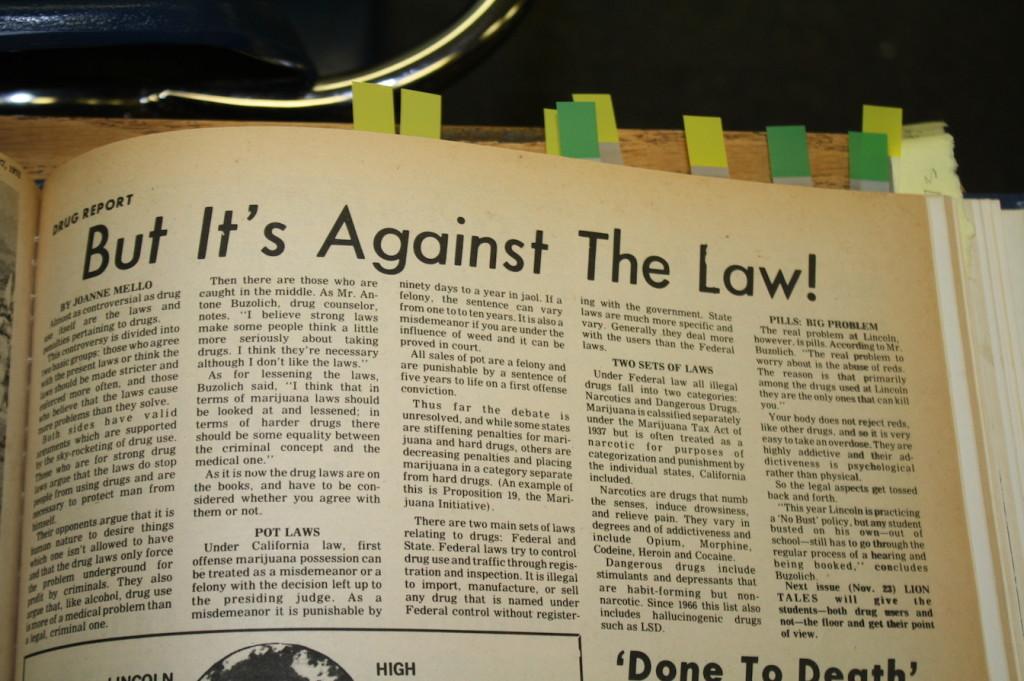
By Joanne Mello
Almost as controversial as drug use itself are the laws and penalties pertaining to drugs. This controversy is divided into two basic groups: those who agree with the present laws or think the laws should be stricter and enforced more often, and those who believe that laws cause more problems than they solve.
Both sides have valid arguments which are supported by the sky-rocketing of drug use. Those who are for strong drug laws argue that the laws do stop people from using drugs and are necessary to protect man from himself.
Their opponents argue that it is human nature to desire things which one isn’t allowed to have and that the drug laws only force the problem underground for profit by criminals. They also argue that, like alcohol, drug use is more of a medical problem than a legal, criminal one.
Then there are those who are caught in the middle. As Mr. Antone Buzolich, drug counselor, notes, “I believe strong laws make some people think a little more seriously about taking drugs. I think they’re necessary although I don’t like the laws.”
As for lessening the laws, Buzolich said, “I think that in terms of marijuana laws should be looked at and lessened; in the terms of harder drugs ther should be some equality between the criminal concept and the medical one. As it is now the drug laws are on the book, and have to be considered whether you agree with them or not.
Pot Laws
Under California law, first offense marijuana possession can be treated as a misdemeanor or a felony with the decision left up to the presiding judge. As a misdemeanor it is punishable by ninety days to a year in jail. If a felony , the sentence can vary from one to ten years. It is also a misdemeanor if you are under the influence of weed and it can be proved in court.
All sales of pot are a felony and are punishable by a sentence of five years to life on a first offense conviction.
Thus far the debate is unresolved, and while some states are stiffening penalties for marijuana and hard drugs, others are decreasing penalties and placing marijuana in a catagory separate from hard drugs . (An example of this is proposition 19, the marijuana initiative).
There are two main sets of laws relating to drugs: Federal and State. Federal laws
(that’s all we got from the transcriber)
###
Letter to the Editor: Drugs, Schedules
October 27, 1972
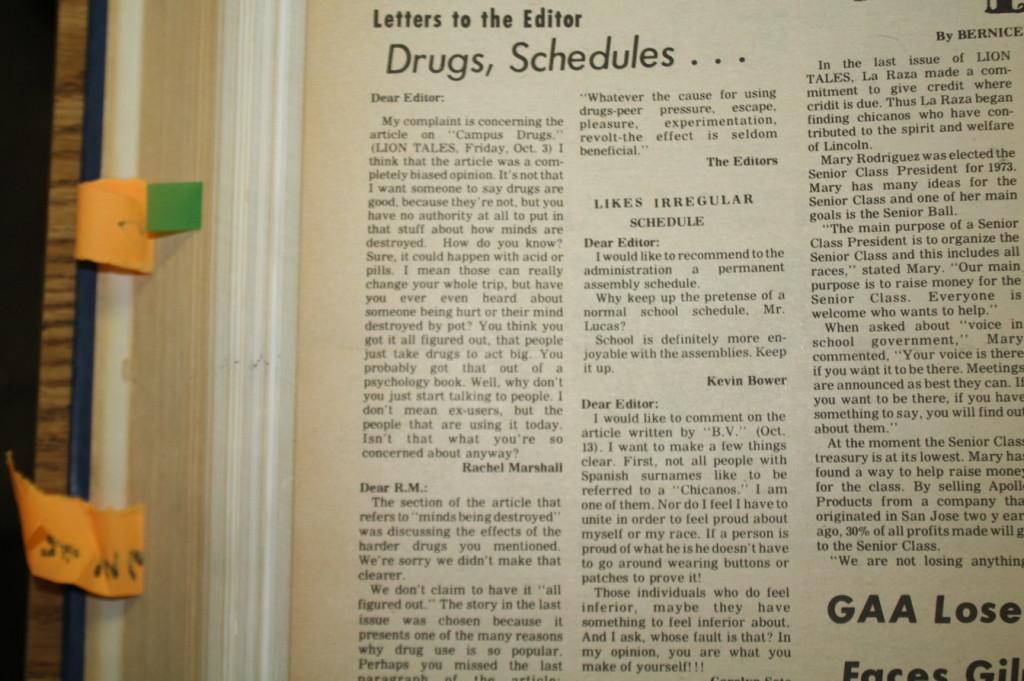
Dear Editor:
My complaint is concerning the article on “Campus Drugs.” (LION TALES, Friday, Oct. 3) I think that the article was a completely biased opinion. It’s not that that I want someone to say drugs are good, because they’re not, but you have no authority at all to put in that stuff about how minds are destroyed. How do you know? Sure, it could happen with acid or pills. I mean those can really change your whole trip, but have you ever even heard about someone being hurt or their mind destroyed by pot? You think you got it all figured out, that people just take drugs to act big. You probably got that out of a psychology book. Well, why don’t you just start talking to people. I don’t mean ex-users, but the people that are using it today. Isn’t that what you’re so concerned about anyway?
Rachel Marshall
###
Drug Report: ‘They’re Only Human And So Am I’
November 10, 1972
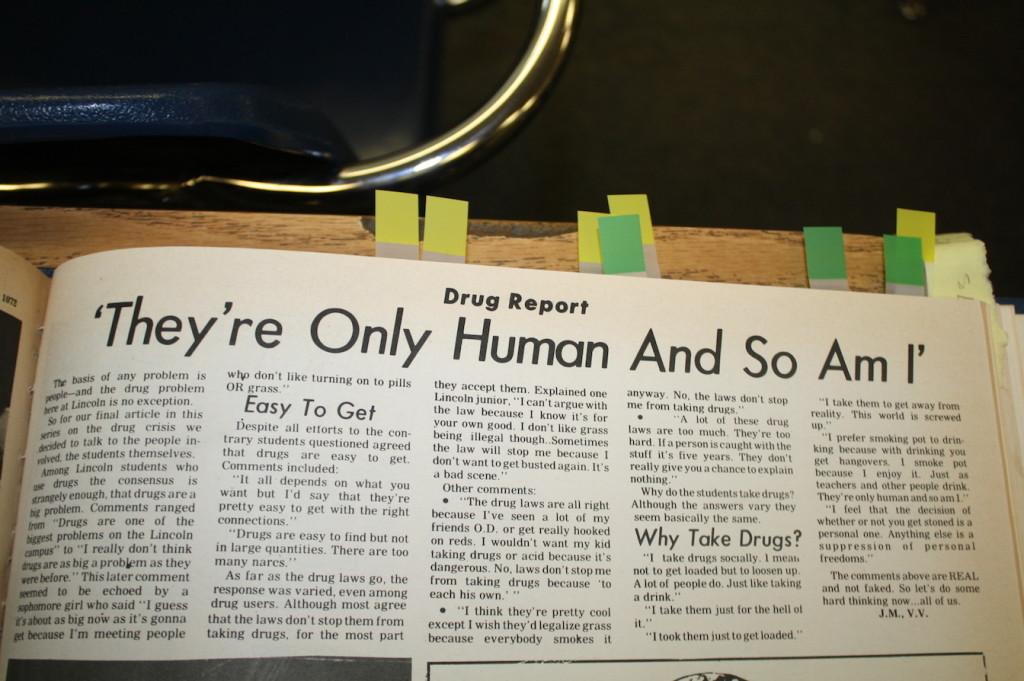
The basis of any problem is people–and the drug problem here at Lincoln is no exception. So for our final article in this series on the drug crisis we decided to talk to the people involved, the students themselves. Among Lincoln students who use drugs the consensus is strangely enough, that drugs are a big problem. Comments ranged from “Drugs are one of the biggest problems on the Lincoln campus” to “I really don’t think drugs are as big a problem as they was before.” This later comment seemed to be echoed by a sophomore girl who said “I guess it’s as big now as it’s gonna get because I’m meeting people who don’t like turning on to pills OR grass…
Easy To Get
Despite all efforts to the contrary students questioned agreed that drugs are easy to get. Comments included: “It all depends on what you want but I’d say that they’re pretty easy to get with the right connections,” “Drugs are easy to finds but not in large quantities. There are too many narcs.” As far the drug laws go, the response was varied, even among drug users. Although most agree that the laws don’t stop them from taking drugs, for the most part they accept them. Explained one Lincoln junior, “I can’t argue with the law because I know it’s for your own good. I don’t like grass being illegal though..Sometimes the law will stop me because I don’t want to get busted again. It’s a bad scene.” Other comments: “The drug laws are all right because I’ve seen a lot of my friends O.D. or get really hooked on reds. I wouldn’t want my kid taking drugs or acid because it’s really dangerous. No, laws don’t stop me from taking drugs because ‘to each his own.”
###
La Raza
November 22, 1972
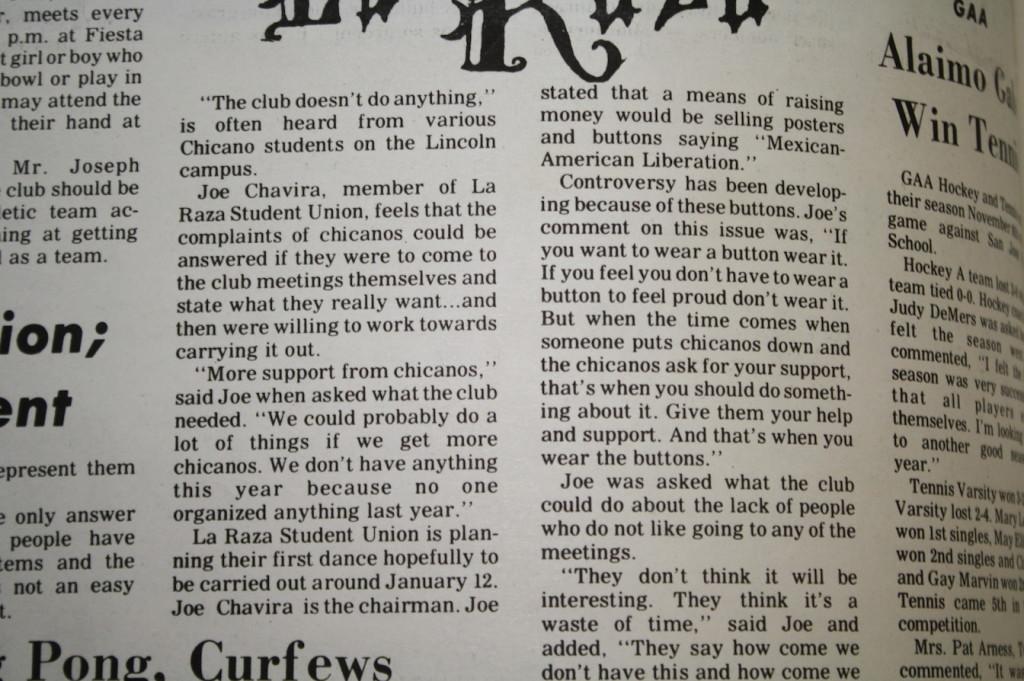
“The club doesn’t do anything,” is often heard from various Chicano students on the Lincoln Campus.
Joe Chavira, a member of La Raza Student Union, feels that the complaints of chicanos could be answered if they were to come to the club meetings themselves and state what they really want…and then were willing to work towards carrying it out.
“More support from chicanos,” said Joe when asked what the club needed. “We could probably do a lot of things if we get more chicanos. We don’t have anything this year because no one organized anything last year.”
La Raza Student Union is planning their first dance hopefully to be carried out around January 12. Joe Chavira is the chairman. Joe stated that a means of raising money would be selling posters and buttons saying “Mexican – American Liberation.”
Controversy has been developing because of these buttons. Joe’s comment on this issue was, “If you want to wear a button wear it. But when the time comes when someone puts chicanos down and the chicanos ask for your support, that’s when you should do something about it. Give them your help and support. And that’s when you wear the buttons.”
Joe was asked what the club could do about the lack of people who do not like going to any of the meetings.
“They don’t think it will be interesting. They think it’s a waste of time,” said Joe and added, “They say how we come we don’t have this and how come we don’t do that. But they don’t put in any effort. Sure we talk about the same thing over and over but it has to be done! If not, when the day of the dance comes we won’t havenothing.”
Joe’s final statement was, “If no one will help me I’ll get it done myself. I figure once I get it started then I’ll probably get participation. All we really need is participation! “
###
Campus Drugs
November 29, 1972
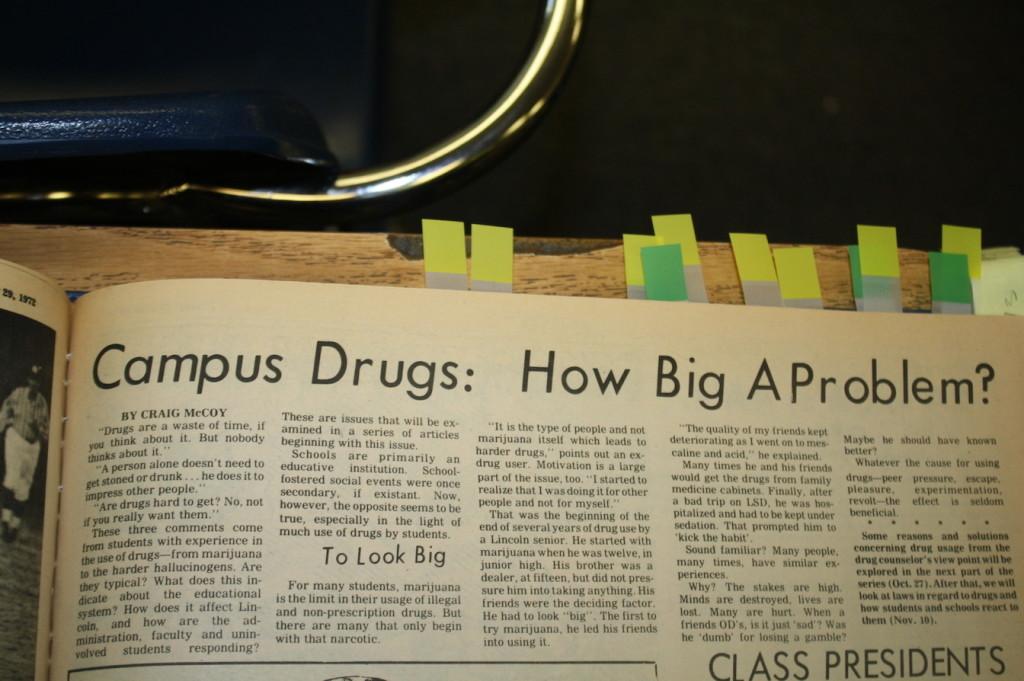
“Drugs are a waste of time, if you think about it. But nobody thinks about it.”
“A person alone doesn’t need to get stoned or drunk… he does it to impress other people.”
“Are drugs hard to get? No, not if you really want them.”
These three comments come from students with experience in the use if these drugs—from marijuana to the harder hallucinogens. Are they typical? What does this indicate about the educational system? How does this affect Lincoln, and how are the administration, faculty and uninvolved students responding? These are issues that will be examined in, a series of articles beginning with this issue.
Schools are primarily an educative institution. School fostered social events were once however, the opposite seems to be true, especially in the light of much use of drugs by students.
For many students, marijuana is the limit in their usage of illegal and non-prescription drugs. But there are many that only begin with that narcotic.
“It is the type of people and not marijuana itself which leads to harder drugs,” points out an ex drug user. Motivation is a large part of the issue, too. “I started to realize that I was doing it for other people and not myself.”
That was the beginning of the end of several years of drug use by a Lincoln senior. He started with marijuana when he was twelve, in junior high. His brother was a dealer, at fifteen, but did not pressure him into taking anything. His friends were the deciding factor. He had to look “big.” The first to try marijuana, he led his friends into using it.
“The quality of my friends kept deteriorating as I went on to mescaline and acid,” he explained.
Many times he and friends would get drugs from family medicine cabinets. Finally, after a bad trip on LSD, he was kept under sedation. That prompted him to “kick the habit.” Sound familiar? Many people, many times, have similar experiences.
Why? The stakes are high. Minds are destroyed, lives are lost. Many are hurt. When a friend OD’s, is it just sad? Was he dumb for losing a gamble? Maybe he should have known better? Whatever the cause for using drugs–peer pressure, experimentation, revolt–the effect is seldom beneficial.
Some reasons and solutions concerning drug usage from the drug counselor’s view point will be explored in the next part of the series (Oct.27) . After that, we will look at laws in regard to drugs and how students and schools react to them (Nov.10).
###
YFU STUDENT FROM URAGUAY
January 19, 1973
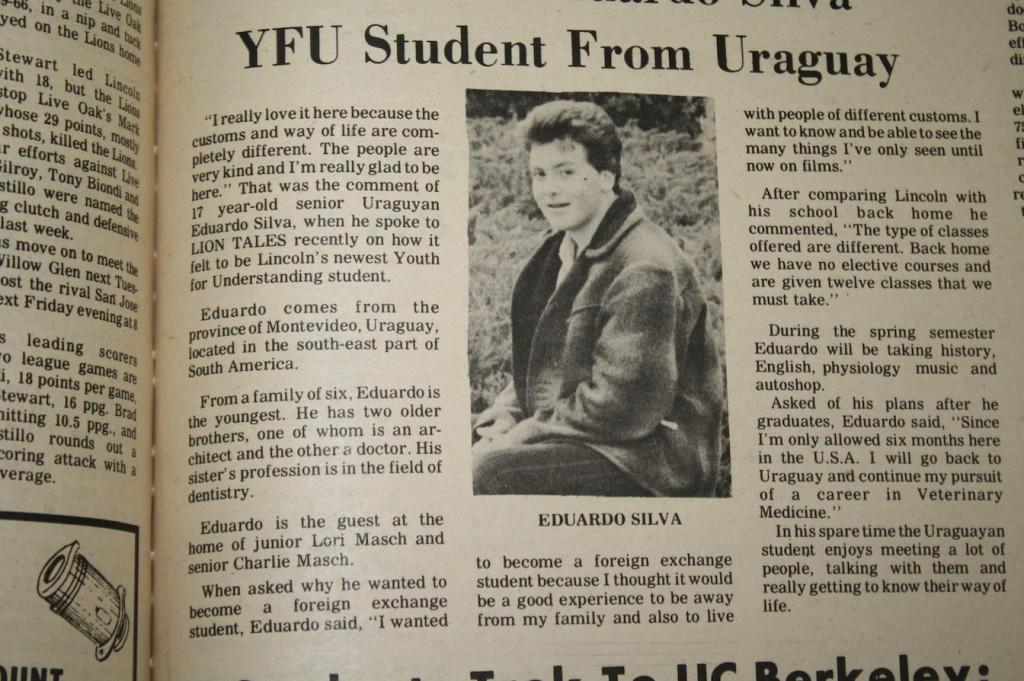
“I really love it here because the customs and way of life are completely different. The people are very kind and I’m really glad to be here.” That was the comment of 17 year-old senior Uraguyan Eduardo Silva, when he spoke to Lion Tales recently on how it felt to be Lincoln’s newest Youth For Understanding student.
Eduardo comes from the province of Montevideo, Uraguay, located in the south-east part of South America.
From a family of six, Eduardo is the youngest. He has two older brothers, one of whom is an architect and the other a doctor. His sister’s profession is in the field of dentistry.
Eduardo is the guest at the home of junior Lori Masch and senior Charlie Masch.
When asked why he wanted to become a foreign exchange student, Eduardo said, “I wanted to become a foreign exchange student because I thought it would be a good experience to be away from my family and also to live with people of different customs. I want to know and be able to see the many things I’ve only seen until now on films.”
After comparing Lincoln with his school back home he commented, “The types of classes offered are different. Back home we have no elective courses and and are twelve classes that we must take.”
During the spring semester Eduardo will be taking history, English, physiology music and autoshop.
Asked of his plans after he graduates, Eduardo said, “Since I’m only allowed six months here in the U.S.A. I will go back to Uraguay and continue my pursuit of a career in Veterinary Medicine.”
In his spare time the Uraguyan student enjoys meeting a lot of people, talking with them and really getting to know their way of life.
###
Viet Nam: Big Mistake?
February 2, 1973
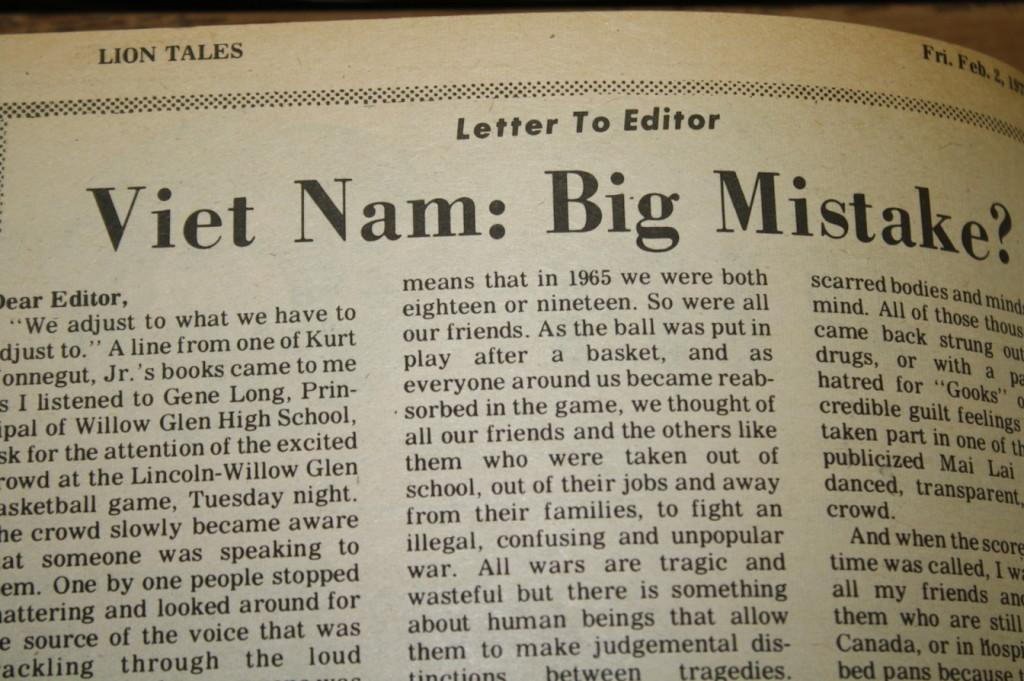
Dear Editor,
“We adjust to what we have to adjust to.” A line from one of Kurt Vonnegut, Jr.’s books came to me as I listened to Gene Long, Principal of Willow Glen High School, ask for the attention of the excited crowd at the Lincoln Willow Glen basketball game, Tuesday night. The crowd quickly became aware that someone was speaking to them. One by one people stopped chattering and began looking for the source of the voice that was crackling through the loud speaker. Only after everyone was quiet came the announcement that the United States and Viet Nam had signed a peace agreement. The crowd roared. As I listened to the cheering throngs, I turned and glanced at my friend, Greg, who is a teacher at Willow Glen. We stared at each other and said nothing. The noise subsided and Greg said finally shrugging his shoulders … they won’t have to go,” he added. We didn’t have to say anything to each other about what we were thinking of as the second quarter of the game resumed.
Like me, Greg is 26 now, which means that in 1965 we were both eighteen or nineteen. So were all our friends. As the ball was put in play after a basket, and as everyone around us became reabsorbed in the game, we thought of all our friends and the others like them who were taken out of from their families, to fight an illegal, confusing and unpopular war. All wars are tragic and wasteful but there is something about human beings that allow them to make judgemental distinctions between tragedies. Parents who are in there 60’s and 70’s can say with a sardonic pride that they have lost a son in “The Big War,” World War II, fighting against fascist world domination. But what can parents who lost a son in Viet Nam say? We lost our son in “The Big Mistake?” 50,000 sets of American parents and hundreds of thousands of Vietnamese families must come to grips with the that question.
And as the referee’s whistle blew for a foul and play was stopped, for all of my friends and others like them who went to “The Big Mistake” and came back with scarred bodies and minds came to mind. All of those thousands who came back strung out on hard drugs, or with a pathalogical hatred for “Gooks” or with incredible guilt feelings for having taken part in one of the other unpublicized Mai Lai massacres, danced, transparent, across the crowd.
And when the score was tied and the time was called, I was thinking of all my friends and others like them who are still in jail, or in Canada, or in hospitals emptying bed pans because they refused to take part in “The Big Mistake.”
And the crowning irony, I was thinking as play resumed on the court, is that what has this “peace with honor” earned us or anybody that couldn’t have been had in 1965? The buzzer sounded and the game was over and as Greg and I filled out of the gym, I said “Do you think we’re too bitter about this whole thing, at least it’s over …”
“Huh?” he said.
“Nothing,” I said. I won’t feel it too long anyway, I thought to myself. After all, we adjust to what we have to adjust to.
-Douglas Kincaid
###
After A Decade Of War-Peace
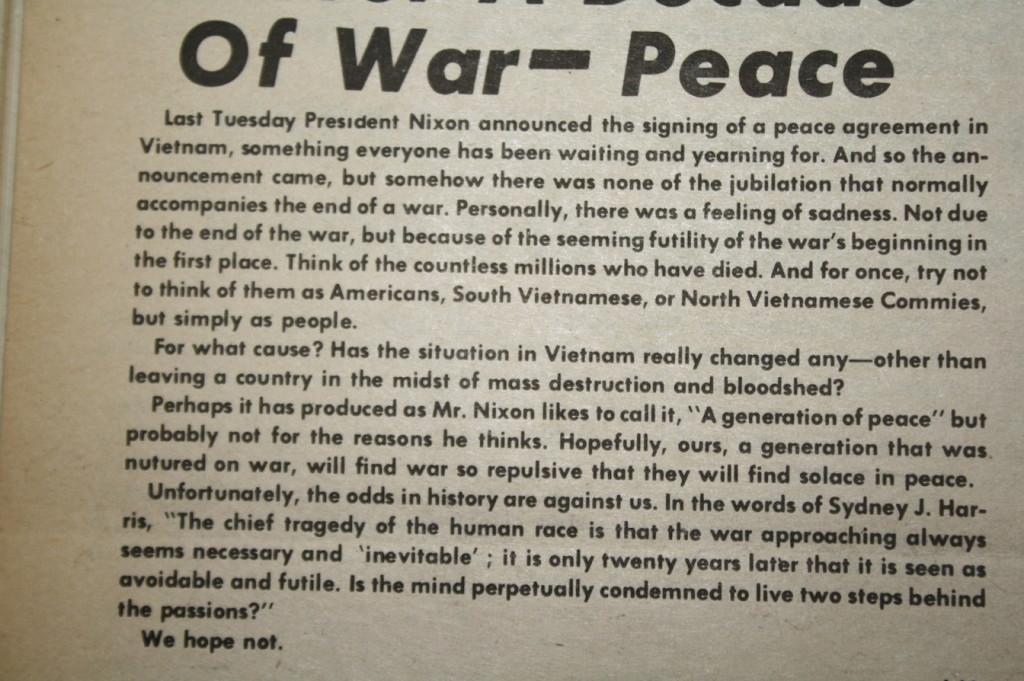
Last Tuesday President Nixon announced the signing of a peace agreement in Vietnam, something everyone has been waiting and yearning for. And so the announcement came, but somehow there was none of the jubilation that normally accompanies the end of the war. Personally, there was a feeling of sadness. Not due to the end of the war, but because of the seeming futility of the war beginning in the first place. Think of the countless millions who have died. And for once, try not to think of them as Americans, South Vietnamese, or North Vietnamese Commies, but simply as people.
For what cause? Has the situation in Vietnam really changed any-other than leaving a country in the midst of mass destruction and bloodshed?
Perhaps it has produced as Mr. Nixon likes to call it, “A generation of peace” but probably not for the reasons he thinks. Hopefully, ours, a generation that was nurtured on war, will find war so repulsive that they will find solace in peace.
Unfortunately, the odds in history against us. In the words of Sidney J. Harris, ”The chief tragedy of the human race is that the war approaching always seems necessary and ‘inevitable’ ; it is only twenty years later that it is seen as avoidable and futile. Is the mind perpetually condemned to live two steps behind the passions?”
We hope not.
###
Women Challenging Usual Roles in Media
March 16, 1973
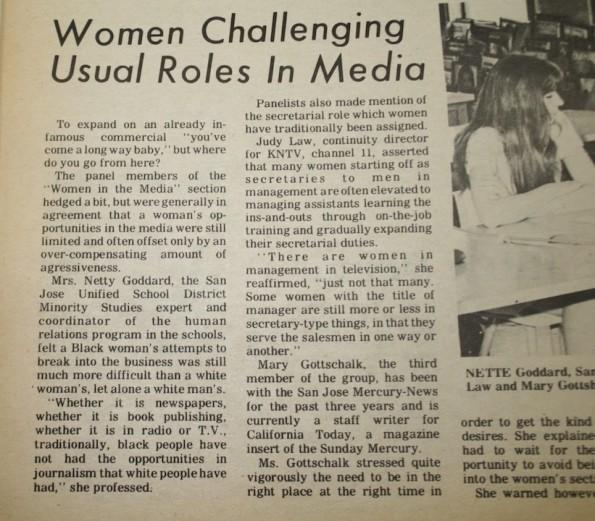
To expand on an already infamous commercial “you’ve come a long way baby,” but where do you go from here?
The panel members of the “Women in the Media” section hedged a bit, but were generally in agreement that a woman’s opportunities in the media were still limited and often offset only by an over-compensating amount of agressiveness.
Mrs. Netty Goddard, the San Jose Unified School District Minority Studies expert and coordinator of the human relations program in the schools, felt a Black woman’s attempts to break into the business was still much more difficult than a white woman’s, let alone a white man’s.
“Whether it is newspapers, whether it is book publishing, whether it is in radio or T.V., traditionally, black people have not had the opportunities in journalism that white people have had,” she professed.
Panelists also made mention of the secretarial role which women have traditionally been assigned.
Judy Law, continuity director for KNTV, channel 11, asserted that many women starting off as secretaries to men in management are often elevated to managing assistants learning ins and outs through the job training and gradually expanding their secretarial duties.
“There are women in management in television,” she reaffirmed, “just not that many. Some women with the title of manager are still more or less secretary type things, in that they serve the salesmen in one way or another.”
Mary Gottschalk, the third member of the group, has been with the San Jose Mercury News for the past three years and is currenly a staff writer for California Today, a magazine insert of the Sunday Mercury.
Ms. Gottschalk stressed quite vigorously the need to be in the right place at the right time in order to get the kind of job one desires. She explained that she had to wait for the right opportunity to avoid being shuttled into the women’s section.
She warned however, that applications are now usually processed through a personel department rather than the old system which allowed the managing editor to do the hiring. The problem, she said, is the conservative nature of the departments making it is increasingly difficult for someone to get a job based on ability rather than appearances and conforming to traditionalist standards.
###
A Returning POW
March 30, 1973
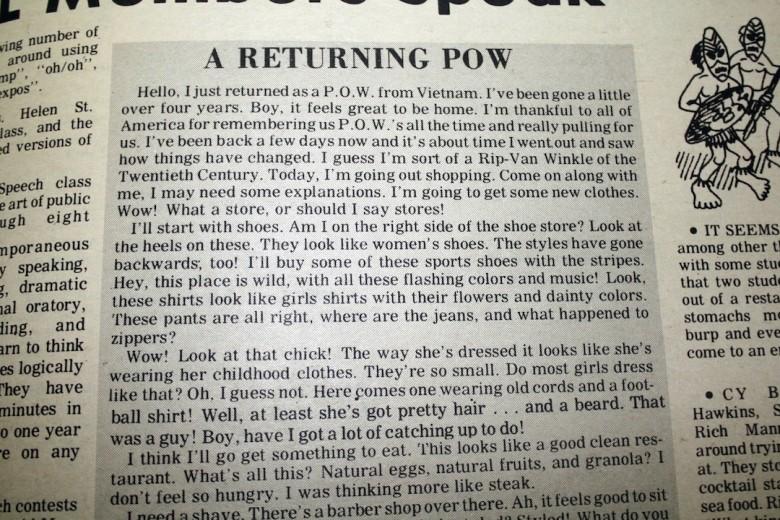
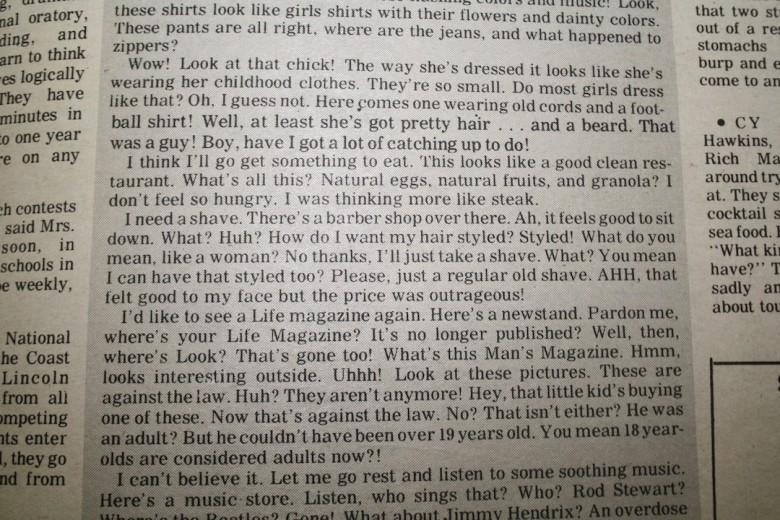
Hello, I just returned as a P.O.W. from Vietnam. I’ve been gone a little over four years. Boy, it feels great to be home. I’m thankful to all of America for remembering us P.O.W.’s all the time and really pulling for us. I’ve been back a few days now and it’s about time i went out and saw how things have changed. I guess I’m sort of a Rip-Van Winkle of the Twentieth Century. Today, I’m going out shopping. Come on along with me, I may need some explanations. I’m going to get some new clothes. Wow! What a store, or should I say stores!
I’ll start with shoes. Am I on the right side of the shoe store? Look at the heels on these. They look like women’s shoes. The style have gone backwards, too! I’ll buy some of these sports shoes with the stripes. Hey, this place is wild, with all these flashing colors and music! Look, these shirts look like girls shirts with their flowers and dainty colors. These pants are all right, where are the jeans, and what happened to zippers?
Wow! Look at that chick! The way she’s dressed it looks like she’s wearing her childhood clothes. They’re so small. Do most girls dress like that? Oh, I guess not. Here comes one wearing old cords and a football shirt! Well, at least she’s got pretty hair… and a beard. That was a guy! Boy, have I got a lot of catching up to do!
I think I’ll go get something to eat. This looks like a good clean restaurant. What all this? Natural eggs, natural fruits, granola? I don’t feel so hungry. I was thinking like steak.
I need a shave. There’s a barber shop over there. Ah. it feels good to sit down. What? Huh? How do i want my hair styled? Styled! What do you mean, like a woman? No thanks. I’ll just a regular old shave. AHH, that felt good to my face but the price was outrageous!
I’d like to see a Life magazine again. Here’s a newsstand. Pardon me, where’s your Life Magazine? It’s no longer published? Well, then, where’s Look? That’s gone too! What’s this Man’s Magazine. Hmm, looks interesting outside. Uhhh! Look at these pictures. These are against the law. Huh? They aren’t anymore! Hey, that little kid’s buying one of these. Now that’s against the law. No? That isn’t either? He was an adult? But he couldn’t have been over 19 years old. You mean 18 year olds are considered adults now?!
###
Blow For Women’s Lib: Girls Compete With Boys
May 4, 1973
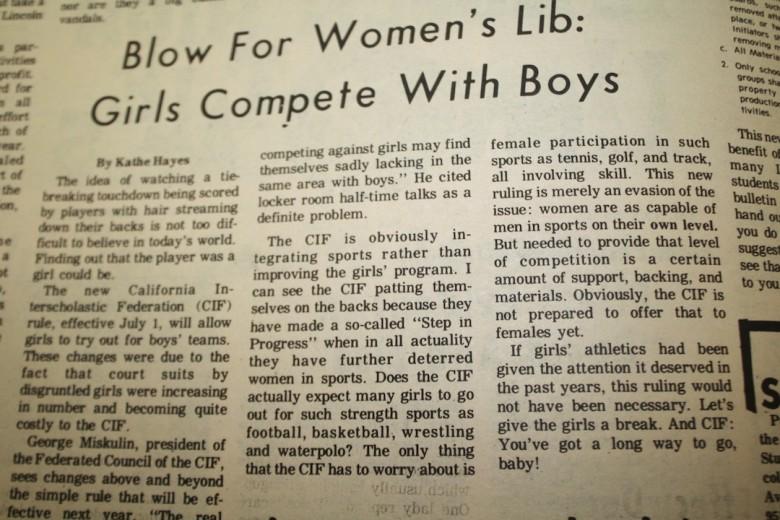
By: Kathe Hayes
The idea of watching a tie-breaking touchdown being scored by players with hair streaming down their backs is not too difficult to believe in today’s world. Finding out that the player was a girl could be.
The new California Interscholastic Federation (CIF) rule, effective July 1, will allow girls to try out for boys’ teams. These changes were due to the fact that court suits by disgruntled girls were increasing in number and becoming quite costly to the CIF.
George Miskulin, president of the Federated Council of the CIF, sees changes above and beyond the simple rule that will be effective next year. “The real competing against girls may find themselves sadly lacking in the same area with boys.” He cited locker room half-time talks as a definite problem.
The CIF is obviously integrating sports rather than improving the girls’ program. I can see the CIF patting themselves on the backs because they have made a so-called “Step in Progress” when in all actuality they have further deterred women in sports. Does the CIF actually expect many girls to go out for such strength sports as football, basketball, wrestling and waterpolo? The only thing that the CIF has to worry about is female participation in such sports as tennis, golf, and track, all involving skill. This new ruling is merely an evasion of the issue: women are as capable of men in sports on their own level. But needed to provide that level of competition is a certain amount of support, backing, and materials. Obviously, the CIF is not prepared to offer that to females yet.
If girls’ athletics had been given the attention it deserved in the past years, this ruling would not have been necessary. Let’s give the girls a break. And CIF: You’ve got a long way to go, baby!
###
Cinco de Mayo ‘Muy Bueno’
May 25, 1973
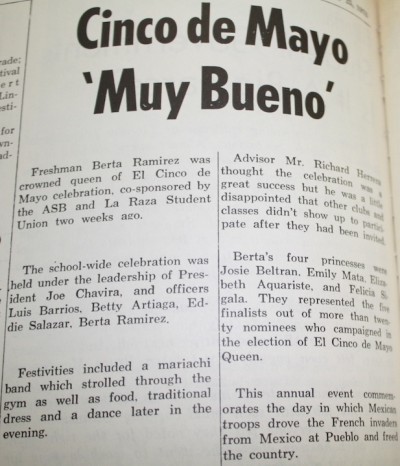
Freshman Berta Ramirez was crowned queen of El Cinco de Mayo celebration, co-sponsored by the ASB and La Raza Student Union two weeks ago.The school-wide celebration was held under the leadership of President Joe Chavira, and officers Luis Barrios, Betty Artiaga, Eddie Salazar, Beta Ramirez.
Festivities included a mariachi band which strolled through the gym as well as food, traditional dress and a dance later in the evening.
Advisor Mr. Richard Herrera thought the celebration was a great success but he was a little disappointed that other clubs and classes didn’t show up to participate after they had been invited.
Berta’s four princesses were Josie Beltran, Emily Mata, Elizabeth Aquariste, and Felicia Sigala. They represented the five finalists out of more than twenty nominees who campaigned in the election of El Cinco de Mayo Queen.
This annual event commemorates the day in which Mexican troops drove the French invaders from Mexico at Pueblo and freed the country.
###
La Raza
June 12, 1973
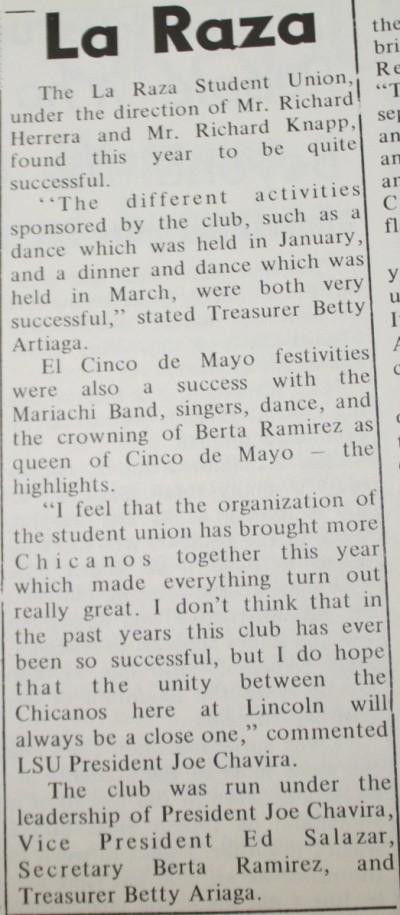
The La Raza Student Union, under the direction of Mr. Richard Herrera and Mr. Richard Knapp, found this year to be quite successful.
“The different activities sponsored by the club, such as a dance which was held in January, and a dinner and dance which was held in March, were both very successful,” stated Treasurer Betty Artiaga.
El Cinco de Mayo festivities were also a success with the Mariachi Band, singers, dance, and the crowing of Berta Ramirez as queen of Cinco de Mayo – the highlights.
“I feel that the organization of the student union has brought more Chicanos together this year which made everything turn out really great. I don’t think that in the past years this club has ever been so successful, but I do hope that the unity between the Chicanos here at Lincoln will always be a close one,” commented LSU President Joe Chavira.
The club was run under the leadership of President Joe Chavira, Vice President Ed Salazar, Secretary Berta Ramirez, and Treasurer Betty Ariaga.
###
To smoke or not to Smoke?
November 14, 1973
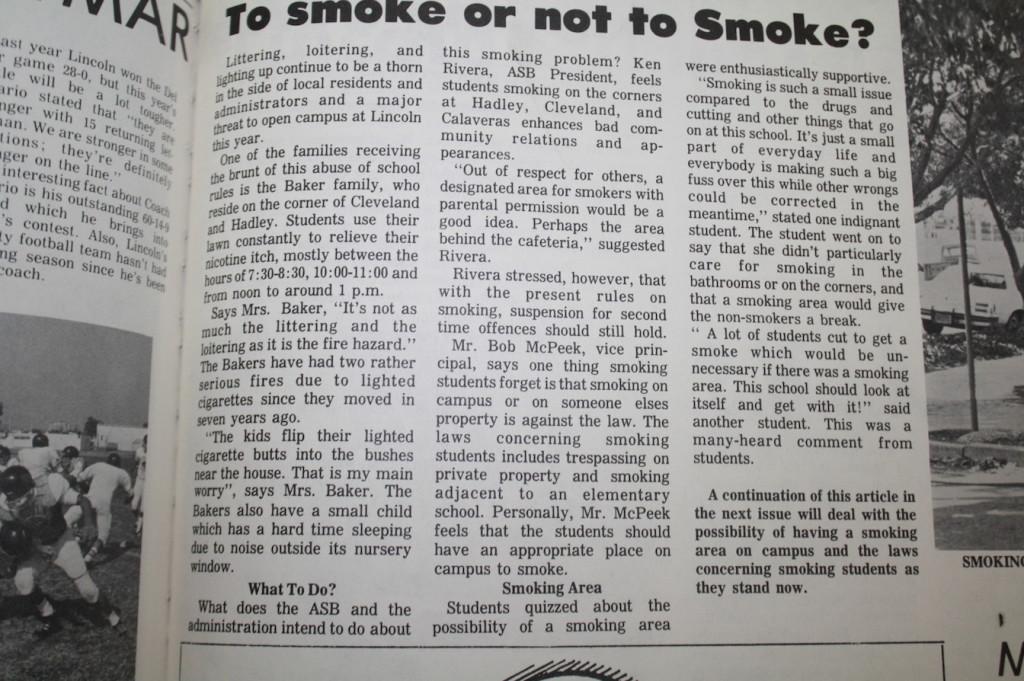
Littering, Loitering, and lighting up continue to be a thorn in the side of local residents and administrators and a major threat to open campus at Lincoln this year.
One of the families receiving the brunt of this abuse of school rules is the Baker family, who reside on the corner of Cleveland and Hadley. Students use their lawn constantly to relieve their nicotine itch, mostly between the hours of 7:30-8:30, 10:00-11:00 and from noon to around 1 p.m.
Says Mrs. Baker, “It’s not as much the littering and the loitering as it is the fire hazard.” The Bakers have had two rather serious fires due to lighted cigarettes since they moved in seven years ago.
“The kids flip their lighted cigarette butts into the bushes near the house. That is my main worry”’ says Mrs. Baker. The Bakers also have a small child which has a hard time sleeping due to the noise outside its nursery window.
What To Do?
What does ASB and the administration intent to do about this smoking problem? Ken Rivera, ASB President, feels student smoking on the corners at Hadley, Cleveland, and Calaveras enhances bad community relations and appearances.
“Out of respect for others, a designated area for smokers with parental permission would be a good idea. Perhaps the area behind the cafeteria,” suggested Rivera. River stressed, however, that with the present rules on smoking, suspension for second time offences should still hold.
Mr. Bob McPeek, vice principal, says one thing smoking students forget is that smoking on campus or on someone elses property is against the law. The laws concerning smoking students includes trespassing on private property and smoking adjacent to an elementary school. Personally, Mr. McPeek feels that the students should have an appropriate place on campus to smoke.
Smoking Area
Students quizzed about the possibility of a smoking area were enthusiastically supportive.
“Smoking is such a small issue compared to the drugs and cutting and other things that go at this school. It’s just a small part of everyday life and everybody is making such a big fuss over this while other wrongs could be corrected in the meantime,” stated one indignant student. The student went on to say that she didn’t particularly care for smoking in the bathrooms or on the corners, and that a smoking area would give the non-smokers a break.
“A lot of students cut to get a smoke which would be unnecessary if there was a smoking area. This school should look at itself and get with it!” said another student. This was a many-heard comment from students.
A continuation of this article in the next issue will deal with the possibility of having a smoking area on campus and the laws concerning smoking students as they stand now.
###
“Passion Pit’ for a Hot Date”
By Ken and Mike Freitas, April 26,1974
Editors Note: The following article is a look back to the 50s and 60s, written in the 70s.
“Girls loved to go steady. It was the girls idea to go steady. They used to wear a bracelet on their ankle to denote whether they were going steady or not.”
“I forgot which one it was. I think if you wore it on your left ankle you were going steady, and if you wore it on your right ankle you were available.”
Mr. Tom Mastel, Lincoln social studies teacher and teenager from the early 50’s, reminisced about dating and lifestyles of two decades ago in comparison with today.
Other 50’s and 60’s teenagers interviewed were Spanish teacher, Miss Nancy Capas, Ms. Pat Beebe, and drama teacher, Mr. Jack Edwards
Ms. Pat Beebe, teenager 60’s met very few mothers of the boys she went out with. She said, “Our society was the kind where people had to have a date with somebody to do anything.” There wasn’t much bunching up, according to Beebe, as a boy and the girl would usually go off in the car together by themselves.
Miss Capas, who’s teenage dating days were mainly the 50’s, explained that in her day, “It used to be a ‘no-no’ to go out with a fellow by yourself. Your mom would get excited if you said you were going out with a guy and not with a group.”
“When a boy asked a girl out for a date he would make sure he would take her to a very nice place for dinner. That doesn’t include Taco Bell or all those other places,” Capas continued.
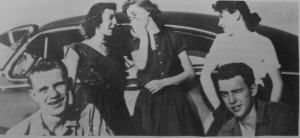 Where were the favorite places to go? Mastel, who said he “played the field,” explained that “Some girls liked to go swimming, some girls liked to go dancing, and some just loved to go to the ‘passion pit’ (I mean the drive-in movie).”
Where were the favorite places to go? Mastel, who said he “played the field,” explained that “Some girls liked to go swimming, some girls liked to go dancing, and some just loved to go to the ‘passion pit’ (I mean the drive-in movie).”
Beebe said the 60’s decade had a lot of organized functions, what were called “spreads” or dinners at some girls house before football or basketball games. “All the guys and girls would then leave the hosts house after for the game after dinner,” explained Beebe.
“After a game,” said Beebe, “my mother would prefer that I come home and sit on the sofa and talk with a guy rather than be out in the park, in his car, or somewhere else.”
Has the morality of dating changed over the years? Mr. Mastel summed this up by saying, “I don’t think the morality has changed because the decisions are still up to the parents.”
Edward, teenager of the 60’s remarked, “When I took a girl out on a date, we went to high school dances, drive-in movies, and necked a lot. And sometimes we just went to a drive drive-in restaurant, ate french fries, and had a coke and got pimples.”
When asked as to whether or not he thought dating morality has changed in the last ten years, Edwards said, “No, mobility has but morality hasn’t. More people have cars and have more of an opportunity to do the things today that we wanted to do then but couldn’t.”
###
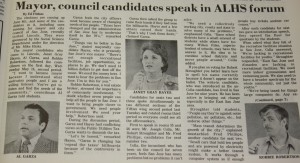
“Mayor, council candidates speak in ALHS forum”
By Ed Finkas
The elections are coming up June 4th…and some of the candidates in it, including ones running for mayor and city council of San Jose, recently visited Lincoln. They were sponsored by the Social Science Department under direction of Mr. Mike Hicks.
The mayor candidates who cam to Lincoln, Janet Gray Hayes, Al Garza, and Robbie Robertson, followed the councilmen on the first day, Wednesday May 15, second period.
“I want to become mayor because I understand what motivates people and I am a willing listener. You’ve got to listen and find the needs of the community,” councilman Al Garza told students.
Garza feels the city officers must become aware of changing needs of the people. “Times have changed and the administration of San Jose has to modernize itself to the 70’s,” remarked Garza.
“Things can be better in San Jose,” stated mayoralty candidate Hayes, who is presently San Jose’s vice mayor. “There’s not enough recreational facilities, job opportunities, or places to go. We don’t need 14 billion dollars to get dust off the moon. We need the money here. I want to hear the problems in San Jose. I’m in this for you.”
Robbie Robertson, a real estate broker, stressed the importance of community involvement. “I doubt whether seven people can help all the people in San Jose. I want to bring people closer to government. We need people involvement. We need your help,” Robertson said.
During the discussion period, Garza and Hayes had conflicting views on the Public Utilities Tax. Garza wants to diminish the tax.
“Let’s be honest,” remarked Hayes,” Garza is changing his ‘repeal the taxes’ billboards because of the controversy in them.”
Garza then asked the group to raise their hands if they had seen the billboards. Hayes and a few others raised their hands. “That’s why I took them down,” claimed Garza.
Candidates for seats two and three spoke simultaneously in two different sections of the Fifties wing second period last Tuesday and rotated rooms third period so everyone could see all the officeseekers.
First to speak in room 55 and 56 were Mr. Joseph Colla, Mr. Robert Stroughter and Mr. Fred Phillips, candidates for seat number two. Colla, the incumbent who has been on the council for seven years, feels San Jose has many problems but no problems it can’t solve.
“We need a collectively working city, county and state to solve many of the problems,” emphasized Colla. “Some school districts have a small amount of students while others have too many. Wilson Riles, superintendent of schools, may have the answer to it. His idea is to combine school districts and move people around,” Colla added.
If you plan on voting for Robert Stroughter you better learn how to spell his name correctly because it doesn’t appear on the ballot. The write-in candidate, who was introduced as the un-Colla candidate, has lived in San Jose for nine years. He has been active in bringing out change especially in the East San Jose area.
Stroughter told students, “People say they’re against noise pollution, air pollution, etc. but endorse other things.”
“Mass transit determines the growth of the city,” explained mustachiod Fred Phillips, another candidate for seat two. “Small cars that hold ten people and are powered by electricity might make a better transit system. It works through a computer system so if enough people buy tickets another car comes.”
After each candidate for seat two gave an introduction speech, they opened the floor for questions by the students.
When asked what they felt of the recreation facilities situation in San Jose, Colla answered, “We’re lacking recreational facilities for youths.” Stroughter responded, “East San Jose and Almaden are lacking in recreational facilities. We need more indoor gymnasiums and swimming pools. We also need to have a broader spectrum for the whole community, not just the youths.”
###
“The Monarch Staff: 1975”
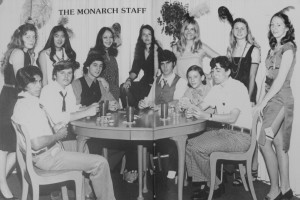
The Monarch staff are the people who are responsible for creating the yearbooks of Abraham Lincoln High School in San Jose, California.
###
“Front of Lincoln: June 12, 1974”
###
“Big Bone Game: 1976”
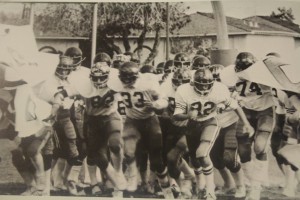
For the first time in years, the annual Big Bone game between San Jose High and Lincoln was not played on the Spartan Stadium field. It was played at San Jose City College, but the difference didn’t seem to upset the Varsity Gridders as they captured the bone for the fourth time in a row. They played for a crowd of over five thousand people, one of the largest crowds to ever attend a Big Bone game.
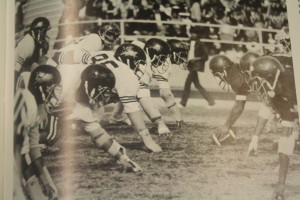
###
“1975-1976 Student Handbook: Our History”
Classes opened at Lincoln High School on September 28, 1942, with an enrollment of 523 students. Mr. Fred Shipp was our first principal. Because of wartime delays the second floor of the main building was not completed. Therefore, students began the semester attending makeshift classes on the first floor of the main building.
Since that time, both the school building and the enrollment has grown considerably. The gymnasium was completed in 1949, as well as the wood, metal, and auto shops. In addition, the science and music wings have been added. In 1950, Dr. Robert Kennedy was selected to replace Mr. Shipp, and the enrollment reached a high of 900. With the opening of Willow Glen and James Lick High Schools at this time, Lincoln’s enrollment again dropped. By 1965 the enrollment had gradually increased to 1,400.
In 1964, Lincoln welcomed a lady principal, Mrs. Mildred I. Meckfessel, who retired in July, 1968. In 1966, the girls gymnasium was finished and in September of 1968, our present principal, Mr. Donald Lucas, came to Lincoln.
Our swimming pool was made possible by Conrad Mendler. He was a big part of Lincoln. He attended all the games, assemblies and rallies. All of the students knew and liked Con. In 1947, he presented Lincoln with a check for $10,000. The students and the Dad’s Club raised 15 thousand dollars and with a like amount of the Board of Education, we had enough for our fine swimming pool.
As of June 1971, Lincoln’s enrollment reflecting the gradual shift in the district growth to the south end of San Jose was 1150.
In the Spring of 1971, the San Jose Unified School District, Board of Education, ordered the closing of 16 schools by the Fall of 1971, that did not meet the specifications of the Field Act, and were declared structurally unsafe in the event of an earthquake. Although Lincoln High School was not one of the schools ordered closed by the Board of Education , more than half of the “feeder” elementary schools and the junior high schools were to be rebuilt, Lincoln and San Jose High were too receive 9th grade students and in effect to become four year high schools. The other three high schools in the district, Leland, Willow Glen, and Pioneer are three year high schools. Ninth grade students from Hoover, Burnett, and Wilson attended Lincoln in the 1971-1972 school year. Lincoln’s attendance will be in excess of 1,301. This has necessitated some critical changes in time scheduling and programming.
###

